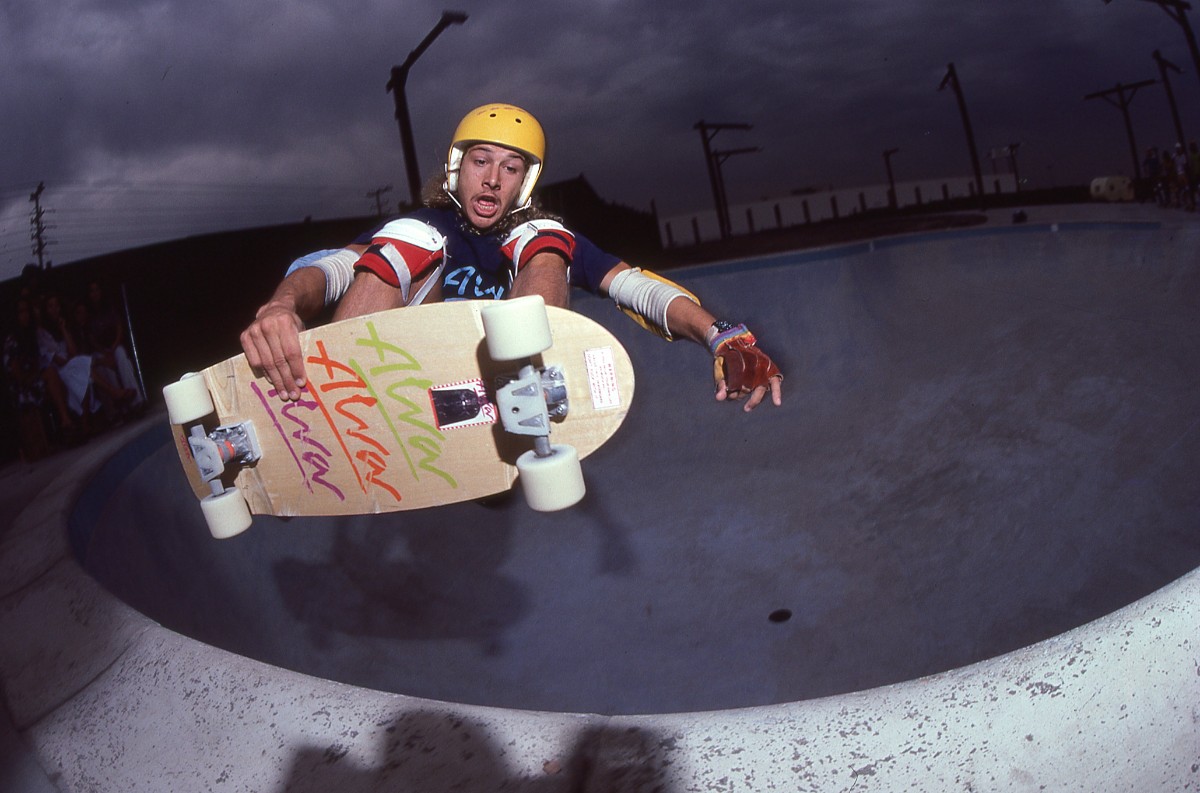This weekend I attended the world premiere of The Tony Alva Story presented by Vans at the Newport Beach Film Festival. The screening took place inside Lido Theater, Balboa Peninsula’s one-screen wonder plumped with 1920s decadence and bygone cinematic drama. (The glittering marquee! The thick, red curtain! The wide seats! The Vans-sticker-wrapped stage! The SHOW!)
It was a perfect venue to debut The Tony Alva Story. A lesson in the progressive counterculture thrumming at the heart of skateboarding, yes, but the movie was also a lesson in unabashed freedom and embracing the no-apologies version of whoever the heck you want to be. What became immediately clear during the 45-minute-long documentary was that Alva had a distinct image, personality and style. He understood cool and conformity could never skate the same empty, backyard pool.

Before the steady drum of social media, Alva learned how to successfully market to the masses without giving off the appearance of mass marketing. His 1970s ads (designed by Eric Monson and photographed by Raul Vega) were revolutionary in their offset images, their minimalist text, their grainy, film-esque visuals and their harsh lighting. Colors were bright or blurred. Photos were sometimes underexposed and always boundary-breaking.
In one ad, Alva is standing on one of his signature Alva skateboards in an empty hallway near a closed, steel door. His hands are in his pockets. He’s looking straight at the camera. There’s a plastic bag over his head. Information to buy a skateboard is written in tiny lettering at the bottom, crossed like an “X” to mark the spot where Alva treasure could be found.
Nothing was perfect. Everything was art, produced prolifically in a way that would make a skateboarding Andy Warhol proud. (Hello to the Vans marketing crew: If there isn’t a coffee table book with this ad series, there should be. I’d buy it. We all would.)
Even today, Alva, an original Z-boy, is an undisputed legend, the “Godfather of skateboarding” revered by skaters nationwide and replicated by none. A good job was done by producers to lift Alva on an unseen (albeit grungy) pedestal, through the stories of skateboarding legends and members of Alva’s own Alva Posse. Color commentary from those who knew was splattered like neon war paint throughout, spoken by Jeff Grosso, Steve Olson, Shepard Fairy, Gus Van Sant, Josh Brolin, Jeff Ament, Glen E. Friedman, Robert Trujillo, Brad Bowman, Pete Zehnder, Jeff Ho and Stacey Peralta.
“I spent a lot of time wondering if I wasted my life,” Grosso said in one self-described “emo” aside. His eyes were a little teary (in the most bad-ass way eyes can possibly tear) and for the viewer on the outside peeping in, it’s unclear if Grosso has or hasn’t. Commercially, he’s a success; his Love Letter to China played in the theater just before the Alva documentary debuted. Maybe that’s enough. Grosso’s light-hearted positivity as he spoke to the Lido Theater crowd hinted that it is.

Peppered between words from the skateboarding wise were flashback clips from “television.” (Putting that word in quotes for the Netflix-streaming readers among us.) With monochromatic anachronism, TV moments showed the strange awkwardness of a suit-and-tie reporter questioning an untamed Alva after a competition win or bewildered anchors attempting to narrate the burgeoning skateboarding scene. Stepping back in time exposed a fun contrast between the edge Alva was building with his brand and the squareness of a TV-dinner, home-by-eight society that just couldn’t understand why these crazy kids wanted to ride.
Alva himself became a more prominent figure as the documentary progressed, and revealed in the post-screening Q&A that some of his final interviews were shot just two weeks before the movie’s debut, in an alley by his house. The story hadn’t been finished to his liking, there were still new things to say.
The rush of freshly made movement became something of a theme, built from the pace of the well-edited interviews and sidewalk surfing montages that slid across the screen. Movement also came from Alva himself, who skated back and forth through the highs and lows of his career while weaving everything together against a gnarly backdrop of progress. He’s changed now. His hair is dreaded, his aura calmer — you could even discern his Zen-like chill as he walked with unhurried ease up the stairs and across the stage to sit for the interview. He’s sober, not partying and definitely not knocking out his teeth on the reg. Alva no longer possesses the frenetic, staccato energy of a teenager scraping by with the dregs of whatever charisma, charm or unconventionality is left after the drugs and alcohol take control. He’s settled into who he is and who he wants to be. Every day he wakes up and surfs. Sometimes, he surfs and skates.
“Have balance in your life,” he told the audience.
Steve Van Doren, son of Vans co-founder Paul Van Doren, was in the theater Saturday and took the mic to share a story not featured on film. When a recent Vans skater had gone missing, his mom contacted Van Doren, who immediately reached out to Alva. Knowing what was what for a young star on the rise, Alva was able to locate the skater, got him the medical help he needed and really, saved his life. The narrative proved Alva’s current status as something of a skateboarding savior. Like Peter Pan of the concrete, he rescues those in need with a bow and arrow made from decades-culled knowledge. Grittily won, freely given.

“This is my story,” the skateboarding icon said onstage at the Q&A, passing off profound one-liners like he was carving the crowd with hard-won wisdom: “Part of creation is being creative,” he explained, also admitting, “The present is the present.”
In the end, when asked why at 61 years old he continues to skate professionally, Alva summed up his life’s work and philosophy as this: “I’m just trying to entertain and stoke some people out.”


